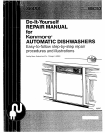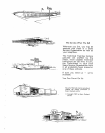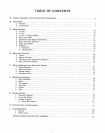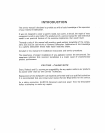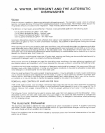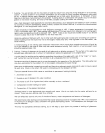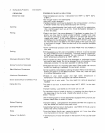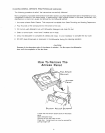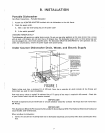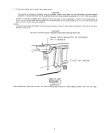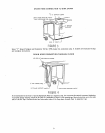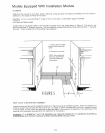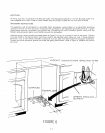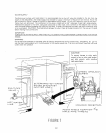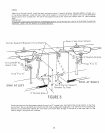
A. WATER, DETERGENT AND THE AUTOMATIC
DISHWASHER
Water
Water is a primary ingredient in determining automatic dishwashing result5 The minerafs in water, when in sufficient
quantity, wilt cause spotting, filming and the possible discoloration of some metals. The minerals which account tot
the greatest difficulty are calcium and magnesium These minerals delermine the hardness ol the water
Theaefin[tibn of hard _ate_: varies s6h_ewP;at However[ m6s{-a_Jthor[fies a'gree G4th the following scaie "
0 to 4 grains hardness per gatlon - soft water
4 to 8 grains hardness per gallon - medium water
8 to 12 grains hardness per gallon - hard water
over 12 grains hardness per gallon - very hard water
Automatic dishwashing results are v_stb/y affected when calcium and magnesium are present in a concentration ot
eight grains per gallon ol more As their concentration increases, the problems of spotting and filming can increase
proportionately
When spotting and filming are caused by hard water conditions, they wilt normally be evident on glassware and table-
ware (silverware! within a short period of time Over a longer period of time, hard water film can build up on the racl.:s,
walls, spray mechanism and heating element of the dishwasher itself The development of hard wa'ter film on the
dishwasher may cause additional problems and reduce the efficiency of the dishw_tsher due to the build-up of the time
deposits on the pump area, drain hoses, etc
If water supplied to the dishwasher is less than !0 grains hard, spotting and filming can be controlled satisfactorily by
the amount of detergent used. in a properly functioning dishwasher
When correct amounts of detergent are used for the availing water conditions, the water softening ingredients wilt
also dissolve calcium and magnesium which have deposited on dishware surfaces in preceding dishwashing cycles
In medium and hard water conditions, the amount of detergent used should be increased We recommend fdhng the
detergent cups under these conditions In some very hard water conditions, it may also be advisable to place addi-
tional detergent in the dishwasher for the main wash cycle
When the total hardness of the water exceeds 12 grains per gallon, it may be advisable to install a water conditioning
unit to remove the catcium and magnesium from the water, in order to insure continuous excellent automatic dish-
washing results Also keep in mind that when a customer already has a water softener that it may not be function-
_nq correctly or it may not be able to handle the capacity needed for the size of the household
REMOVAL AND CONTROL OF HARD WATER FILM
A 5% or 6% acidic solution, such as vinegar, will remove hard water film and may be used lo determine its presence
on glassware Place a small amount of vinegar in a bowl and allow filmed glassware to soak in the vinegar for 3 to 10
minutes Remove from vinegar, rinse and blot dry tf the film present was due to hard water, it will have been re-
moved
The following "home" method may be used to remove hard water film from glassware and the dishwasher: Allow
dishwasher to fill for the main wash cycle; place two cups vinegar in the water and allow machine 1o complete the
entire cycle Do not place metalware, plasricvvare, silverware, cutlery, or detergent m dJsh_c'asher when performing
[h_ fffm _tnpping prodes_
The Automatic Dishwasher
The automatic dishwasher is blamed for many problems over which it exercises no control A properly funclioning
dishwasher, properly loaded, using the recommended amount of a good dishwasl_er detergent and having the speci*
fled water charge will do an excellent job of cleaning
Some of the problems that do arise and are caused by conditions other than functional characleristics of the dish*
washer are as follows:



